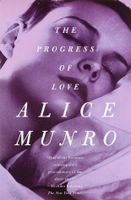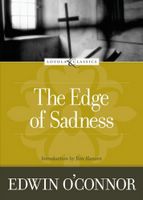When I was just a little girl, I asked my mother what will I be? Will I be pretty, will I be rich? Here's what she said to me...(Now you can start singing, since you know what's coming next:))...Actually, when I was in 10th grade, we were studying the Middle Ages and had to decide on a career path that we would have had if we had lived during that era. They were all MALE professions, mind you...so I chose(out of court jester, knight, peasant, monk) monk. If we had actually had female options, I would have chosen nun. Why? Lots of reasons...I'm a person who likes time to think in a meditative state, I prize self-education, and I enjoy teaching, music, working in gardens and cooking, amongst other things...I also am always searching for(and have done a decent job I think of creating) a sense of community in my life, which I think the church was for many people back then. So, service to God it is...Why this tangent?
The Edge of Sadness, Edwin O'Connor's 1962 Pulitzer-winning novel, is told from the point of view of a Catholic priest. This was an interesting departure for me. I've read the Bible tons, I've read books about religion, I've read C.S. Lewis, I've read books with priests as secondary characters, but I don't think I've ever before read a book with the entire story told by a priest. What I found remarkable, was how honest the prose was. The protagonist, Hugh Kennedy(Ironically he has the same first name as the protagonist in one of my favorite books of ALL TIME,
How Green Was My Valley) is a man who by his occupation is an outsider...people look to him as confessor, not as confessee. He is a keen observer of people in a very straightforward, often comically so, approach. In this novel, he attempts to tell the story of the Carmody family, or so he promises:"This story at no point becomes my own. I am in it--good heavens, I'm in it to the point of almost never being out of it!--but the story belongs, all of it, to the Carmodys, and my own part, while substantial enough, was never really of any great significance at all" (O'Connor 3). However, he is in the entire story, not only colouring the reader's views through his narratorship, but also as a character to whom many others turn. We even, as the reader, get many opportunities to hear about his background history. The story of the Carmodys may not be his own, but the story of
The Edge of Sadness very much is. Not only because he is in it, but because he is TELLING it, he is its creator. What made me think about my earlier tangent(remember, me as a nun?) was that I read what this narrator had to say, and much of it struck a chord with me because I have had similar thoughts...In fact sometimes I felt like he had snatched the ideas right from my very brain! (Too bad I was born 18 years after the book was published!) I think that even now, the notion of priest is romanticized(and not always in a good way) and we forget that priests are servants to God, but they are also first and foremost men: full of innate desires, prone to human error. We are reminded of this through all of the clergymen that are prevalent in this novel: Hugh himself, his childhood friend John Carmody, and Hugh's assistant pastor, Father Danowski. Father Carmody is especially fascinating because he is such an oxymoron: a shepherd who doesn't want to have anything to do with a flock! He even says, towards the very end of the novel: "There's always one thing more. Every day. The same old whimpers and whispers and groans and tears from people who can't manage their own lives and who can hardly wait to bolt down their breakfasts before rushing up to the rectory to tell me they can't. And it's all nonsense, it means nothing. I'm a priest, not a wastebasket. These people who every morning sing to themselves, 'Pack up your troubles in your old kit bag and take them up to Father'--I want them for once, just once, to stay at home. Or at least to stop talking. To
shut up. That's all. Just for a while. Because I'm tired, Hugh. Dead tired. Worn thin. It can't go on this way" (O'Connor 409). There is a plot to this novel, it is about the characters and their dealings with the patriarch of the Carmody family, Charlie, who is a domineering, not exactly good nor well-loved person, who has made his way to the top through shrewd business dealings and nickel and diming every person he can. Charlie is very real, as are the people who surround him: his children and his "friends," for even the narrator is unsure as to whether these men could be considered Charlie's friends or if they have just grown up together and known each other for so long(after all they are all old men) that they are just too familiar to let go. It is Hugh, though, with whom a reader can fall in love, both as a person and a narrator, for what he says about the people he meets and life in general is just so true. "We all share in a shattering duality--and by this I don't mean that soggy, superficial split that one so often sees: the kind of thing for example, where the gangster sobs uncontrollably at an old Shirley Temple movie. I mean the fundamental schism that Newman referred to when he spoke of man being forever involved in the consequences of some "terrible, aboriginal calamity";every day in every man there is this warfare of the parts. And while all this results in meanness and bitterness and savagery enough, God knows, and while only a fool can look around him and smile serenely in unwatered optimism, nevertheless the wonder of it all is to me the frequency with which kindness, the essential
goodness of man does break through, and as one who has received his full measure of that goodness, I can say that for me, at least, just as much as in the magnificence of heroes, that the meaning and glory of man is revealed"(O'Connor 253)...This novel is full of poetry in the guise of prose, seeds of knowledge strewn throughout a field of pages. Hugh is a priest, who is also a man, a man who saw into the depths of despair after the death of his father, and through help was able to pull himself together and become, if not a better priest, at least a generous observer of the human spirit. He sees with wit, intelligence and a good dollop of sarcasm every once and a while...If only all of us could be such. In the vein of being true to one's thoughts and situations, I must admit that I wasn't always held firmly to the book, my mind did wander(though I also have to wonder if that is due to the fact that I've been reading SO much lately that my mind just has to take breaks sometimes), though to what it wandered at times was relevant. The irony of course, did not escape me that I finished most of the book in the library at UW, in a room that much resembled the interior of a Catholic church...Churches, though they all at once fill me with a sense of wonder, nearness to God and overall peace, also fill me with trepidation. According to Catholic dogma most specifically, I'm not what you would consider an ideal citizen of the kingdom of God. Priests also concern me slightly due to a fear that they might be too judgemental, too condemning...
The Edge of Sadness reminded me that, at least with fictitious priests(and this is probably true for most of the human race), one is often far more judgemental of oneself than others...Perhaps I have nothing to worry about;). GG's-16, Pulitzers-15.




